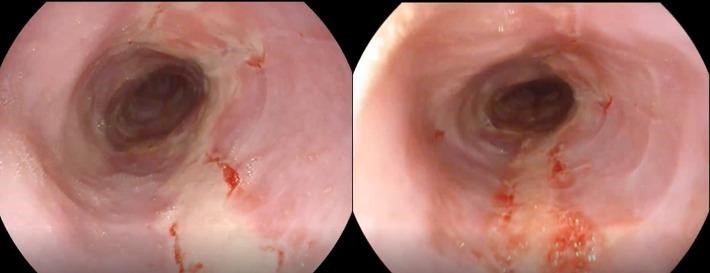Monday Poster Session
Category: Esophagus
P2823 - Occupational Pesticide Exposure Leading to Erosive Esophagitis and Secondary Candida Superinfection in an Immunocompetent Patient
Monday, October 27, 2025
10:30 AM - 4:00 PM PDT
Location: Exhibit Hall

Ahmad Abdulraheem, MD (he/him/his)
MedStar Washington Hospital Center-Georgetown University
Washington, DC
Presenting Author(s)
Ahmad Abdulraheem, MD1, Khaled Rafeh, MD2, Mohammad A. Rayyan, 3, Nada Odeh, MD3, Mohammad Alzoubi, MD3, Dania Qarkash, MD4, Mustafa Ramadan, MD5
1MedStar Washington Hospital Center-Georgetown University, Washington, DC; 2School of Medicine, The University of Jordan, Shmeisani, 'Amman, Jordan; 3School of Medicine, The University of Jordan, Amman, 'Amman, Jordan; 4University of Jordan, Washington, DC; 5Istishari Hosptial, Amman, 'Amman, Jordan
Introduction: Pesticide exposure is a recognized occupational hazard with well-documented systemic effects. However, gastrointestinal manifestations, including esophageal injury, are rare. Even more uncommon is the development of Candida esophagitis in an immunocompetent individual following pesticide ingestion, suggesting mucosal injury as a potential predisposing factor.
Case Description/
Methods: A previously healthy 61-year-old female agricultural worker presented with progressive dysphagia and odynophagia for six months, accompanied by a 15 kg unintentional weight loss and intermittent epigastric pain. Symptoms followed several incidents of ingesting food contaminated with pesticides containing alpha-cypermethrin and imidacloprid. According to the patient, there was no history of heartburn, nausea, vomiting, hematemesis, melena, alcohol consumption, or use of nonsteroidal anti-inflammatory drugs.
Physical examination revealed epigastric tenderness and halitosis. Laboratory workup showed elevated CRP (18.5 mg/L), normal CBC, and negative infectious screening. Esophagogastroduodenoscopy (EGD) revealed circumferential ulcerations extending from the upper esophageal sphincter to 32 cm, along with mild gastropathy. Biopsies demonstrated erosive esophagitis with granulation tissue infiltrated by inflammatory cells and polarizable crystalloid material resembling oxalate crystals. No evidence of malignancy, HSV, CMV, or fungal infection was found (Fig. 1).
She was treated with dexlansoprazole 60 mg daily and sucralfate, with clinical improvement noted within 5–6 days. A follow-up EGD two months later showed ulcer healing and esophageal trachealization, at which point medications were discontinued. However, symptoms recurred six months later. Repeat EGD revealed esophageal strictures and white exudates. Biopsy confirmed Candida esophagitis. She was treated with fluconazole 150 mg daily for 21 days alongside 40 mg esomeprazole.
Discussion: This case highlights a rare instance of pesticide-induced chemical esophagitis, evidenced by crystalline deposits and exclusion of other causes, complicated by Candida superinfection in an immunocompetent host. It underscores the potential of mucosal injury to predispose even healthy individuals to opportunistic infections. A high index of suspicion for chemical esophagitis is warranted in individuals with occupational pesticide exposure, and early endoscopic evaluation with close follow-up for secondary infections should be considered.

Figure: Figure 1. Initial endoscopic images showing circumferential esophageal ulcerations with erythema and minimal bleeding, indicative of erosive esophagitis likely secondary to pesticide exposure. The left image shows the ulcerations with clear mucosal damage, while the right image demonstrates additional ulcerations with minor bleeding, consistent with the early stages of esophageal injury.
Disclosures:
Ahmad Abdulraheem indicated no relevant financial relationships.
Khaled Rafeh indicated no relevant financial relationships.
Mohammad Rayyan indicated no relevant financial relationships.
Nada Odeh indicated no relevant financial relationships.
Mohammad Alzoubi indicated no relevant financial relationships.
Dania Qarkash indicated no relevant financial relationships.
Mustafa Ramadan indicated no relevant financial relationships.
Ahmad Abdulraheem, MD1, Khaled Rafeh, MD2, Mohammad A. Rayyan, 3, Nada Odeh, MD3, Mohammad Alzoubi, MD3, Dania Qarkash, MD4, Mustafa Ramadan, MD5. P2823 - Occupational Pesticide Exposure Leading to Erosive Esophagitis and Secondary Candida Superinfection in an Immunocompetent Patient, ACG 2025 Annual Scientific Meeting Abstracts. Phoenix, AZ: American College of Gastroenterology.
1MedStar Washington Hospital Center-Georgetown University, Washington, DC; 2School of Medicine, The University of Jordan, Shmeisani, 'Amman, Jordan; 3School of Medicine, The University of Jordan, Amman, 'Amman, Jordan; 4University of Jordan, Washington, DC; 5Istishari Hosptial, Amman, 'Amman, Jordan
Introduction: Pesticide exposure is a recognized occupational hazard with well-documented systemic effects. However, gastrointestinal manifestations, including esophageal injury, are rare. Even more uncommon is the development of Candida esophagitis in an immunocompetent individual following pesticide ingestion, suggesting mucosal injury as a potential predisposing factor.
Case Description/
Methods: A previously healthy 61-year-old female agricultural worker presented with progressive dysphagia and odynophagia for six months, accompanied by a 15 kg unintentional weight loss and intermittent epigastric pain. Symptoms followed several incidents of ingesting food contaminated with pesticides containing alpha-cypermethrin and imidacloprid. According to the patient, there was no history of heartburn, nausea, vomiting, hematemesis, melena, alcohol consumption, or use of nonsteroidal anti-inflammatory drugs.
Physical examination revealed epigastric tenderness and halitosis. Laboratory workup showed elevated CRP (18.5 mg/L), normal CBC, and negative infectious screening. Esophagogastroduodenoscopy (EGD) revealed circumferential ulcerations extending from the upper esophageal sphincter to 32 cm, along with mild gastropathy. Biopsies demonstrated erosive esophagitis with granulation tissue infiltrated by inflammatory cells and polarizable crystalloid material resembling oxalate crystals. No evidence of malignancy, HSV, CMV, or fungal infection was found (Fig. 1).
She was treated with dexlansoprazole 60 mg daily and sucralfate, with clinical improvement noted within 5–6 days. A follow-up EGD two months later showed ulcer healing and esophageal trachealization, at which point medications were discontinued. However, symptoms recurred six months later. Repeat EGD revealed esophageal strictures and white exudates. Biopsy confirmed Candida esophagitis. She was treated with fluconazole 150 mg daily for 21 days alongside 40 mg esomeprazole.
Discussion: This case highlights a rare instance of pesticide-induced chemical esophagitis, evidenced by crystalline deposits and exclusion of other causes, complicated by Candida superinfection in an immunocompetent host. It underscores the potential of mucosal injury to predispose even healthy individuals to opportunistic infections. A high index of suspicion for chemical esophagitis is warranted in individuals with occupational pesticide exposure, and early endoscopic evaluation with close follow-up for secondary infections should be considered.

Figure: Figure 1. Initial endoscopic images showing circumferential esophageal ulcerations with erythema and minimal bleeding, indicative of erosive esophagitis likely secondary to pesticide exposure. The left image shows the ulcerations with clear mucosal damage, while the right image demonstrates additional ulcerations with minor bleeding, consistent with the early stages of esophageal injury.
Disclosures:
Ahmad Abdulraheem indicated no relevant financial relationships.
Khaled Rafeh indicated no relevant financial relationships.
Mohammad Rayyan indicated no relevant financial relationships.
Nada Odeh indicated no relevant financial relationships.
Mohammad Alzoubi indicated no relevant financial relationships.
Dania Qarkash indicated no relevant financial relationships.
Mustafa Ramadan indicated no relevant financial relationships.
Ahmad Abdulraheem, MD1, Khaled Rafeh, MD2, Mohammad A. Rayyan, 3, Nada Odeh, MD3, Mohammad Alzoubi, MD3, Dania Qarkash, MD4, Mustafa Ramadan, MD5. P2823 - Occupational Pesticide Exposure Leading to Erosive Esophagitis and Secondary Candida Superinfection in an Immunocompetent Patient, ACG 2025 Annual Scientific Meeting Abstracts. Phoenix, AZ: American College of Gastroenterology.
